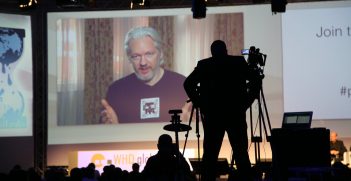It’s the Enrichment, Stupid: South Australia and the Nuclear Fuel Cycle

The South Australian Nuclear Fuel Cycle Royal Commission recently released a report outlining its tentative findings to little fanfare and almost no press coverage. Yet these findings have the potential to propel Australia into a politically sensitive global controversy, rile regional allies and the United States and even undermine nuclear non-proliferation and disarmament.
The specific finding of concern is that South Australia should consider engaging in uranium enrichment. While the report indicates that uranium enrichment by itself is not economically feasible (pp 8-9), the authors later indicate that in combination with nuclear fuel leasing, it should be seriously studied:
The most mature commercial processing technologies—wet conversion and centrifuge enrichment—would be a logical starting point for linking with the storage and disposal of waste… [Processing options] should be carefully considered because they provide broader economic advantages in the form of new highly skilled employment and associated technology transfer opportunities (20).
Why would Australia engaging in uranium enrichment have so many negative consequences? The answer is easy: because uranium enrichment is one of two major routes to nuclear weapons. While Australia would not develop uranium enrichment technology to create nuclear weapons, we cannot say the same with confidence about others in the region and around the world.
Some background is helpful. A major sticking point in international nuclear negotiations – whether related to the Nuclear Non-proliferation Treaty (NPT), Iran’s nuclear program, or South Korea’s nuclear energy program – is a country’s perceived “right” to uranium enrichment. Indeed, Article VI of the NPT affirms the ‘inalienable right of all the Parties to the Treaty to develop research, production and use of nuclear energy for peaceful purposes without discrimination’, which many states interpret as the right to uranium enrichment. Currently, 13 countries are able to enrich uranium and many others have expressed serious interest in doing so (thanks to the Royal Commission this now includes Australia).
However, stopping the spread of uranium enrichment is critical to nuclear non-proliferation. The equipment that allows a country to enrich uranium for civilian nuclear fuel is the exact same equipment that allows a country to enrich uranium for nuclear weapons. Once this capacity is acquired, the major technological barrier to nuclear weapons is gone and it is very difficult to stop a state with this capacity from crossing the nuclear threshold if so desires. Iran is an excellent case in point. The current Joint Comprehensive Program of Action took over a decade to negotiate, and its success in preventing Iranian nuclear weapons is by no means assured.
Limiting uranium enrichment is also important to nuclear disarmament. Already many experts question whether nuclear-armed states will give up their weapons. If more countries acquire the capacity to create fissile material, then these states will be even less likely to consider nuclear disarmament. Additionally, should countries that gain uranium enrichment decide to misuse it for military purposes, it would only lengthen the list of states that would have to give up their nuclear weapons for nuclear disarmament to succeed.
Australians may ask at this point, ‘What does this have anything to do with us and our domestic economic and industrial decision-making?’ Unfortunately for South Australia, the answer is ‘everything.’ Currently the US has been able to stave off numerous countries’ demands to enrich uranium because of its leverage in the global civilian nuclear market. In its nuclear agreements with the United Arab Emirates and Taiwan, Washington was able to insist on the “gold standard,” which meant that the countries gave up their right to enrich uranium or reprocess plutonium. However, other countries are not so eager to sign up for this. In the Middle East, Jordan has refused to give up its right to enrichment in any agreement with the US, leading to stalled negotiations and concerns that Jordan will simply turn to another country that doesn’t insist on the gold standard.
Closer to home, Washington and Seoul avoided a near diplomatic disaster in their conflict over uranium enrichment. South Korea refused to sign an agreement that banned uranium enrichment, but the US refused to offer anything else. In the end, the countries came to a compromise by allowing a limited form of nuclear reprocessing and agreeing to continue discussions on uranium enrichment. This commitment to continued discussions on enrichment was critical to Seoul accepting the deal; as one South Korean official noted ‘It is meaningful that we have opened the pathway for uranium enrichment, albeit not in the foreseeable future.’ A similar problem occurred in Vietnam. In the end the countries negotiated a compromise in which the non-binding preamble to the agreement implies that Vietnam will not enrich or reprocess.
This broader global context shows why the Royal Commission must expand its understanding of risk when producing its final report. Uranium enrichment is not just a question of local economic growth, state environmental concerns or federal laws and regulations. It also heaves Australia into the diplomatically-fraught and politically-sensitive quagmire of global nuclear politics. South Australia cannot expect blithely to announce that it is interested in uranium enrichment without generating a whirlwind of controversy both regionally and globally.
In South Korea for example, officials are seething that the Japanese have enrichment capabilities while they do not; news that Australia intends to acquire it as well would not go unnoticed in Seoul. Some argue that South Korea is interested in uranium enrichment not only for its civilian nuclear program, but also for military reasons. A poll this month in indicated that almost 70% of Koreans felt the country should have its own nuclear weapons. Beyond this one might wonder if the Royal Commission’s final report might draw the attention of the US. With Washington so heavily invested in stopping the spread of uranium enrichment, an Australian declaration of interest in enrichment could provoke the ire of one of its closest allies.
In its final report due in May 2016, the South Australian Nuclear Fuel Cycle Royal Commission should be more sensitive to the global political and security dimensions of uranium enrichment. Otherwise, it risks plunging the country into a divisive global debate, putting Australia in opposition to not only its commitments to nuclear non-proliferation, but also its regional partners and best allies.
A senior lecturer in international relations at Monash University, Dr Maria Rost Rublee is an expert on global nuclear politics and a frequent speaker at international conferences on the topic. Her first book, Nonproliferation Norms: Why States Choose Nuclear Restraint, was awarded the Alexander George Book Prize for best book in political psychology. This article is published under a Creative Commons Licence. It may be republished with permission.





